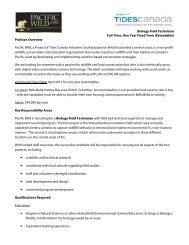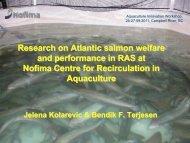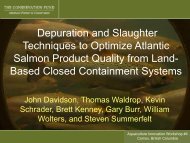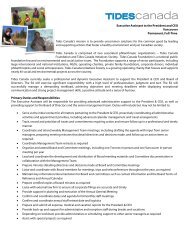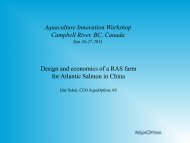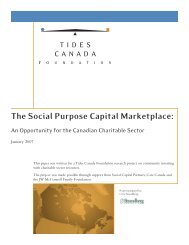Entrepreneurial Solutions to Insoluble Problems - Tides Canada
Entrepreneurial Solutions to Insoluble Problems - Tides Canada
Entrepreneurial Solutions to Insoluble Problems - Tides Canada
- No tags were found...
You also want an ePaper? Increase the reach of your titles
YUMPU automatically turns print PDFs into web optimized ePapers that Google loves.
Growing OpportunityDeeper Dive: Energy‘It was difficult for us<strong>to</strong> negotiate with largecorporations <strong>to</strong> begin with.They have more lawyers anda different style. I would likeaccess <strong>to</strong> training <strong>to</strong> “speaktheir language” and access<strong>to</strong> board-level contacts.’Energy Sec<strong>to</strong>r110http://shop.easybeinggreen.com.au/categories.asp?cID=71&fromhome=true111www.chicagoclimatex.com112www.climatechangecapital.com113www.freeplayenergy.com114www.hm-treasury.gov.uk/independent_reviews/stern_review_economics_climate_change/sternreview_index.cfm115www.ceres.orgAnother venture that aims <strong>to</strong> makesustainable energy choices more accessible<strong>to</strong> ordinary people is Easy Being Green,founded in Australia by Nic Frances andPaul Gilding, but with plans <strong>to</strong> gointernational. 110 In 2004, they set a goalfor 70% of Australian homes <strong>to</strong> be 30%more energy and water efficient within10 years. Since then they have implementedprograms that have provided almost halfa million homes with ‘Climate Saver Packs’;reduced 620,000 <strong>to</strong>nnes of CO 2 pollutionper year, equivalent <strong>to</strong> taking 150,000cars off the road; saved 5.8 gigaliters ofwater, equivalent <strong>to</strong> 2,500 Olympic-sizedswimming pools; and saved householdsA$32.3 million on their energy bills.5 Business models:take climate in<strong>to</strong> accountDisclosing greenhouse emissions is onething, putting a price — and a value —on them is quite another. Two organizationshave been working in this area: RichardSandor’s Chicago Climate Exchange(CCX) 111 is the world’s first, and NorthAmerica’s only voluntary, legally bindingrules-based greenhouse gas emissionreduction and trading system; and JamesCameron’s Climate Change Capital (CCC) 112is a leading investment banking group thatspecializes in the commercial opportunitiescreated by a low carbon economy. CCCadvises and invests in companies thatrecognize combating global warming isboth a necessity and an economicopportunity. Its activities include investmentmanagement and financing emissionreductions, and its aim is <strong>to</strong> make theworld's environment cleaner whiledelivering attractive financial returns.Longer term, it will be interesting <strong>to</strong> seewhat happens <strong>to</strong> such players when theChinese get serious about greenhouseemission trading.Then there are the ‘Robin Hood’ models.Whether or not such a figure ever s<strong>to</strong>lefrom the rich <strong>to</strong> give <strong>to</strong> the poor, differentpeople certainly place a different value —and are prepared <strong>to</strong> pay very differentprices — for anything from their health <strong>to</strong>clean fuels. In the energy sec<strong>to</strong>r, the mos<strong>to</strong>utstanding example of this is probablyFreeplay Energy, 113 which started ou<strong>to</strong>ffering wind-up radios and expanded <strong>to</strong>a wide range of other human-poweredproducts.43Whether from the basic needs angleor because of systemic challenges likeclimate change, energy is central <strong>to</strong> thesustainable development agenda. The UKStern Review, which described climatechange as effectively the biggest marketfailure of all time, calculated that thedangers of unabated climate changewould be equivalent <strong>to</strong> at least 5% ofGDP each year. 114 Overall, it estimated thatthe dangers could be equivalent <strong>to</strong> 20% ofGDP or more. In contrast, it argued that thecosts of action <strong>to</strong> reduce greenhouse gasemissions <strong>to</strong> avoid the worst impacts ofclimate change could be limited <strong>to</strong> around1% of global GDP each year. People wouldpay a little more for carbon-intensivegoods, but our economies would continue<strong>to</strong> grow strongly. According <strong>to</strong> one measure,the benefits over time of actions <strong>to</strong> shiftthe world on<strong>to</strong> a low-carbon path couldbe in the order of $2.5 trillion each year.Markets for low-carbon technologies willbe worth at least $500 billion, and perhapsmuch more, by 2050 if the world acts onthe scale required.The potential impact of social andenvironmental entrepreneurs in this areawas dramatically illustrated by the successof Ceres, 115 led by its President MindyLubber, in helping stall plans by TXU <strong>to</strong>build 11 coal-fired power stations in theUSA. Even though 150 coal-fired powerplants are currently proposed in thecountry, TXU’s $10 billion coal expansionplan drew intense criticism in terms of thelikely climate impacts. When the plans wereannounced, Ceres convened some of TXU’slargest shareholders, including CalPERS,CalSTRS, and the New York CityComptroller’s Office, <strong>to</strong> bring pressure <strong>to</strong>bear. Some time later, it was announcedthat two private equity firms — KohlbergKravis Roberts & Co and the Texas Pacific— would buy TXU for $45 billion, and woulddrop eight of the proposed power stations.Strikingly, the private equity firms consultedCeres and other critics ahead of the dealbeing signed. We expect a lot more of thissort of power politics.



